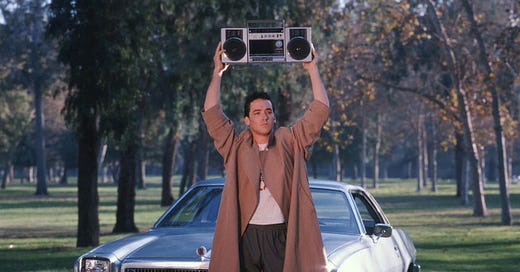Little Acts of Love Have a Big Impact
Flowers and chocolates are nice but it's the small acts of affection that make a person feel truly cared for and appreciated.
What makes a person feel loved? In the movies, it's the dramatic expressions of love that melt our hearts. Think Rose and Jack on the bow in Titanic or my all time favorite, the boom box serenade in Say Anything. While romantic and certainly melodramatic, we don't need grand gestures to generate an enduring experience of warmth and support in real life. It's about little acts of love—the everyday gestures and expressions of warmth and support—that provide an abiding sense of connection. These micromoments may not be Instagram-worthy but they are more than worthwhile.
According to a study conducted by Penn State University, seemingly mundane moments and expressions of affection make all the difference when it comes to feelings of self-worth and positive wellbeing. The researchers found that people who experience frequent "felt love" or feelings of genuine resonance and connection with others report significantly higher levels of wellbeing, optimism, and purpose.
Felt love need not be romantic—it can take the form of a friendly chat with a neighbor, a co-worker offering to help out on a project, or a welcoming smile from a teacher. "Everyday felt love is conceptually much broader than romantic love. It's those micromoments in your life when you experience resonance with someone. For example, if you're talking to a neighbor and they express concern for your well-being, then you might resonate with that and experience it as a feeling of love, and that might improve your well-being." said Zita Oravecz, assistant professor of human development and family studies.
The study was conducted over a course of four weeks. Each day, participants were sent six prompts at random times asking them to rate their feelings of felt love and wellbeing. Interestingly, as they study progressed and as participants were continually reminded to be aware of small positive gestures from others, they increasingly reported more felt love experiences. The experience of participating in the study turned into an upward spiral of positivity. Simply paying attention to everyday moments of felt love seemingly increased awareness of manifestations of love in the participants' daily lives.
A recent survey found that seven in 10 people said frequent little gestures are "a thousand times more important" than the occasional big loving gesture. Sure, flowers and chocolates are nice but it's the small acts of affection that make a person feel truly cared for and appreciated. Everyday life presents countless opportunities to feel love and to make others feel loved.
Here are three ways to make your loved ones feel more loved:
1. Pay Attention
Consistent high quality listening and responsiveness are essential for building and bolstering connection. Responsiveness entails signaling to the person that you genuinely understand, value, and care about them every single day. Rather than turning away, turn toward. Look up from your phone when they speak to you. Give them your full attention. Listen without judgement to what they have to say. Look at them with fresh eyes. Don't allow intimacy or closeness to dampen curiosity. As the poet David Whyte observes, "Alertness is the hidden discipline of familiarity." The act of paying attention is an act of love.
2. Quiet Acts of Kindness
Simple thoughtful gestures are the best reminders of love. When asked what little gestures would melt respondents' hearts, a survey found that a third (35%) wished for someone to take care of dinner without having to ask. Thirty-four percent said doing the grocery shopping for them would be positively swoon-worthy and 32 percent would be thrilled if someone would fill their car with gas for them. Unlike heavy-handed gestures, the most effective kind of support is often invisible to the recipient. Moreover, acts of love are beneficial to the donor even if the recipient has no idea. Indeed, acting compassionately may be its own reward.
3. Acts of Grace
Assume positive intent. Give the benefit of the doubt. May your knee-jerk response be to commend rather than to criticize. Justice Ruth Bader Ginsburg shared some advice given to her by her mother-in-law on her wedding day that captures the essence of grace: "In every good marriage, it helps sometimes to be a little deaf. I have followed that advice assiduously, and not only at home through 56 years of a marital partnership nonpareil. I have employed it as well in every workplace, including the Supreme Court. When a thoughtless or unkind word is spoken, best tune out. Reacting in anger or annoyance will not advance one's ability to persuade." Biting one's tongue or letting it go can also be an act of love.
In the same way that little acts of love are the lifeblood of every good relationship, in their absence connection desiccates. In an article in The Atlantic, The Marriage Lesson That I Learned Too Late, author Matthew Fray writes about how love crumbles, closeness fades, goodwill evaporates, and trust melts away without the presence of felt love.
"The things that destroy love and marriage often disguise themselves as unimportant. Many dangerous things neither appear nor feel dangerous as they're happening. They're not bombs and gunshots. They're pinpricks. They're paper cuts. And that is the danger. When we don't recognize something as threatening, then we're not on guard. These tiny wounds start to bleed, and the bleed-out is so gradual that many of us don't recognize the threat until it's too late to stop it."
He continues:
"If I had to distill the problems in failed relationships down to one idea, it would be our colossal failure to make the invisible visible, our failure to invest time and effort into developing awareness of what we otherwise might not notice in the busyness of daily life."




